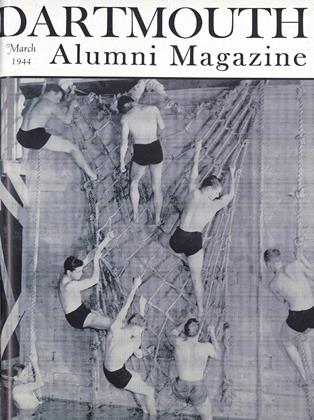IF you LIKED Liebling's The Road Backto Paris as much as I did you will want to get his The Telephone Booth Indian, now fortunately available in Penguin books for only a quarter of a dollar. Here you will read about the wrestling shows, "Pull His Whiskers!", "The Jollity Building," and other gems, most and perhaps all of which appeared in the New Yorker. Reminiscent of Damon Runyon except that Liebling's stories are true.
Charles Jackson's The Lost Weekend is a remarkable tour de force which you have undoubtedly heard about and maybe read. It is the saga of an alcoholic; it is the story of a Paul Bunyan of booze. Enough liquor flows down the gullet of Don Birnam in five days to float a Chriscraft, and the author notes his actions, reveries, and ratiocinations with the subtle hand of a master.
The book is far from successful as a novel but it is successful in depicting the body and soul of a confirmed suicidal drinker.
As somebody said before me it should be distributed gratis by the W.C.T.U. in all hotel rooms along with the Gideon Bibles. Read it and weep. (Farrar, 1944.)
A book for which I will gladly sing one hosannah is Leland Stowe's They ShallNot Sleep. Here you will learn much about The Burma Road scandal, before the Japs squashed it by taking a good part of it, of the "colonial" spirit of the British officials in Burma and India which was criminal in its consequences and results, of the spirit of the Flying Tigers before and after attacking Japs, and finally of Russia, which takes up about half of the book.
The plain truths here should be known by the American people and you will not have read many of them in the newspapers.
It is undoubtedly true as Dr. Chan recently told me when I talked to him about this book that all Americans lack perspective about the vast country which is China but nonetheless what Stowe tells about Chungking and the Burma Road has the ring of truth, perspective or no. We should be informed about the Far East and this is an informing book written by one of the best of our foreign correspondents.
Stowe recommends as the best book about the Flying Tigers 01ga S. Greenlaw's The Lady and the Tigers (Dutton, 1943-) I have it before me and the amount I have read verifies his judgment. Some of the books I have read on Chennault's men may have been written by men, as Stowe says, who never even flew in Burma. This book is doubly interesting as having been written by an observant woman who knew the "Tigers" well.
D. W. Brogan's The English People (Knopf) is excellent though it sometimes presupposes a knowledge of England that most Americans lack. But it is a very thoughtful book even if it must be classed as propaganda.
Ernie Pyle's Here is Your War is well worth your time.
I'm sorry to have overloaded my column with war books. One of these months I'll write about detective stories. That's a promise.
Dean E. Gordon Bill writes: "By all odds the finest story I have read in several years is The Spanish Lady by Maurice Walsh. It is not a mystery story, but a very fine character study with much of the flavor of Lorna Doone."
He also recommends: The Gobi Desert by Cable and French, and Jan Smuts by Crafford.
My old friend Ranny Hobbs advises me that one of Farrar's new books TheLost Weekend is a superlative piece of writing.
 View Full Issue
View Full Issue
More From This Issue
-
 Article
ArticleTEACHING NAVY TRAINEES
March 1944 By ARTHUR DEWING '25 -
 Sports
SportsWith Big Green Teams
March 1944 By Dick Gilman '45 -
 Class Notes
Class Notes1918
March 1944 By ERNEST H. EARLEY, DONALD L. BARR -
 Class Notes
Class Notes1931
March 1944 By CHARLES S. MCALLISTER, WILLIAM A. GEIGER -
 Lettter from the Editor
Lettter from the Editor'Round the Girdled Earth
March 1944 -
 Article
ArticleARTHUR FAIRBANKS '86
March 1944 By DR. FREDERIC P. LORD '98
HERBERT F. WEST '22
-
 Article
ArticleHANOVER BROWSING
November 1935 By Herbert F. West '22 -
 Article
ArticleHanover Browsing
April 1938 By HERBERT F. WEST '22 -
 Article
ArticleHanover Browsing
March 1939 By HERBERT F. WEST '22 -
 Books
BooksFROM THE GROUND UP,
October 1943 By Herbert F. West '22 -
 Article
ArticleHanover Browsing
February 1946 By HERBERT F. WEST '22 -
 Article
ArticleHanover Browsing
May 1950 By HERBERT F. WEST '22







